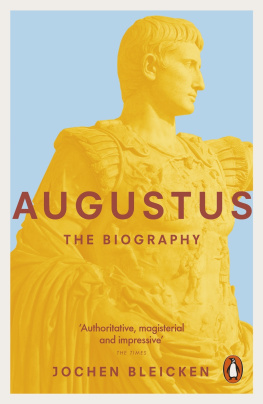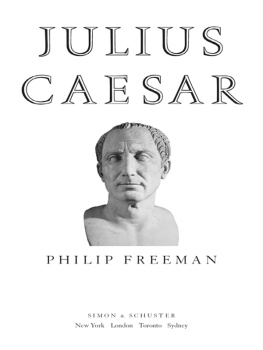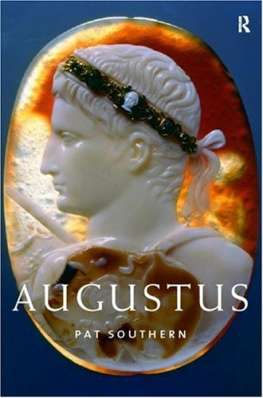Contents
Jochen Bleicken
AUGUSTUS
The Biography
Translated by Anthea Bell
ALLEN LANE
UK | USA | Canada | Ireland | Australia
India | New Zealand | South Africa
Allen Lane is part of the Penguin Random House group of companies whose addresses can be found at global.penguinrandomhouse.com.
First published in German by Alexander Fest Verlag, Berlin 1998
This translation published in Allen Lane 2015
Copyright Alexander Fest Verlag, Berlin, 1998
Translation copyright Anthea Bell, 2015
Cover design: Rowan Powell
Cover photograph akg images
The moral right of the author and translator has been asserted
Grateful acknowledgement is given to the following for permission to reproduce copyrighted illustrations:
ISBN: 978-0-241-00390-9
THE BEGINNING
Let the conversation begin...
Follow the Penguin Twitter.com@penguinukbooks
Keep up-to-date with all our stories YouTube.com/penguinbooks
Pin Penguin Books to your Pinterest
Like Penguin Books on Facebook.com/penguinbooks
Listen to Penguin at SoundCloud.com/penguin-books
Find out more about the author and
discover more stories like this at Penguin.co.uk
1
The Ides of March
Rome was on the alert. Gaius Julius Caesar, who had been appointed dictator for life at the end of the previous year, was planning to set out in a few days time to wage war on the Parthians, who had been threatening the Roman province of Syria since the crushing defeat of Marcus Licinius Crassus at Carrhae in the year 53 BC . It was clear that this would be a difficult venture, comparable in its extent to the Gallic War, the campaign of several years in which Caesar had conquered those parts of Gaul that still remained free and subjected them to Roman rule. No one knew whether Caesars aim this time was simply to exact revenge for the defeat of Crassus or whether he wanted to acquire more territory. The only certainty was that he would be absent from Rome for some time.
The dictator had called a meeting of the Senate for , to be held in the Curia of Pompey, an assembly hall built by Pompey the Great adjoining the theatre that also bore his name. Caesar shrugged off warnings of an assassination attempt, just as he dismissed the idea of surrounding himself with a bodyguard, trusting that his policy of reconciliation with the representatives of the old aristocracy and his own political position, so far uncontested in public, would stand him in good stead. He had dismissed his Spanish guards from his service some time earlier. It is possible that, at the height of his power and in view of his age and his failing health, he felt a certain indifference to the future. In fact we are told that he said, at this time, that his well-being was of importance primarily to the state; he had gained power and fame in abundance long before, and if anything were to happen to him now, then unrest and civil wars far worse than any seen before would threaten Rome.
Caesar could not, therefore, be dissuaded from attending the scheduled Senate meeting. As soon as he was seated in his gilded chair of office, the conspirators surrounded him on the pretext of supporting a petition presented by one of their number. Then, at an agreed signal, they stabbed him. Struck by many dagger thrusts, Caesar resisted only briefly and then fell to the ground at the foot of the statue of Pompey, his old adversary in the struggle for power and influence in the state. The assassins had agreed that every one of them must stab him, so that they would all be equally complicit in their violent act, but in their fury and agitation they had delivered their blows so indiscriminately that of all the twenty-three wounds (or, according to another account, thirty-five) a doctor later established that only one was mortal. After the deed was done Marcus Brutus raised his bloodstained dagger in the air, called out the name of Cicero and congratulated him on Romes return to freedom.
Now that the tyrant had been eliminated, the assassins thought that the republican order he had toppled would come into its own again. But the conspirators cries of liberty rang unheard through the Senate as its members scattered, horrified by the murder. Only two senators, the praetors Lucius Marcius Censorinus and Gaius Calvisius Sabinus, had tried to stand by the dictator, but the conspirators had pushed them out of the way. The people of Rome themselves were dismayed by the assassination and incapable of any political reaction. Shops and businesses closed, some of those eager for news ran to the Forum, many others barricaded themselves into their houses, and only a few spoke of freedom.
The conspirators were a very mixed bunch. Hardly any of them could claim never to have served the dictator; many, including their leaders, had even held high rank in the army and the administration, and still did at the time of Caesars assassination. Even if they kept at a certain distance from the new regime, they were what would be called fellow travellers today. The real, uncompromising opponents of Caesar had taken up arms to defend the old order, had perished in its cause or were now wandering around the vast empire in search of a centre of resistance somewhere. Many of the conspirators, including Marcus Brutus and Cassius, had originally fought on the side of the Senate and Pompey against the dictator, but after being defeated had sought pardon and political promotion, which were generously granted. Not a few of the assassins belonged to the dictators intimate circle, including several experienced generals (legates) and others who were personally very close to him. It is not always easy to discern a clear motive for these mens participation in the plot. In fact there has been no discussion of the motives behind the murder in general, either in antiquity or today; it seemed unnecessary, since few have doubted that at least the great majority of the conspirators were motivated by the idea of restoring the old order of the state, which they associated with political freedom. Whether they had fought with Caesar in the civil war or had opposed him and been pardoned after the defeat of Pompey, they might approve, or at least tolerate, his securing of his exceptional position by violent means, but they were not ready to go along with the increasingly obvious transformation of the old aristocratic order into a monarchy.
The uncompromising traditionalists numbered among them not only Brutus and Cassius, but also some conspirators who had not yet held high office in the state, for instance Publius Servilius Casca and Lucius Pontius Aquila, who as tribune of the people in the year 45 had been the only man in the college of tribunes to show the dictator his republican sympathies. Personal motives may have played a part for some of the conspirators; Servius Sulpicius Galba, for instance, must surely have joined their ranks not least because he had been passed over for promotion by Caesar. All the conspirators, however, whether republicans or opportunists, had lived for years under the dictators rule or even worked in his administration, so there was a great gulf dividing them from those who had remained steadfast in opposing him by armed force. It was only natural that after the Ides of March such men expected the conspirators to explain their readiness to be reconciled with the tyrant, or even work for him. At first, many who had been associated with the dictator for so long might not have fully understood the political consequences of the civil war waged by Caesar in 49, allegedly solely to retrieve his personal political status, although later, once their general had risen to the position of a monarch, they withdrew their allegiance. They incurred the hostility of Caesars supporters, who were bound to regard participation in the plot by those who had been his colleagues, generals and even friends as treachery.

















